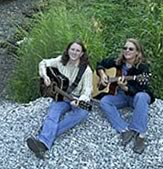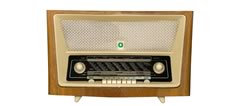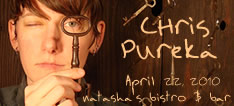artists \
mother jane

biography \\
Over the course of their four albums, Mother Jane has gradually completed their progression into a full-fledged electric folk-rock duo. Where once there was the six-string acoustic guitar of Beth Burden layered with Lisa Raymond’s 12-string acoustic, lightly supported with percussion, there is now a wash of electric guitars and basses, a full drum kit and even a Hammond B-3 organ. Where once the comparisons began and ended with the Indigo Girls and Shawn Colvin, there are now strains of Melissa Etheridge, Counting Crows, a little Ben Harper and maybe even some Loggins & Messina wafting through Mother Jane’s fourth and latest offering, This Time Tomorrow.
Mother Jane began as a trio back in 1998, Beth Burden’s vision initially. A self-taught singer/songwriter/guitarist, Burden was raised in a musical family in small-town Paris, Kentucky, a 15-minute drive from Lexington through many of the countless horse farms that dominate the area. She was already a veteran of the coffeehouse scene in nearby Morehead, where she’d studied at Morehead State, and in Bozeman, Montana, where she landed for a year when her money ran out on what supposed to be a cross-country escapade, but this was the first time she’d formed a band. Beth came up with the name Mother Jane by combining Mother Jones, one of the leading labor organizers of late-19th and early-20th century America, with Calamity Jane, a western legend in the late 1800s. “I actually wanted to name the band Mother Jones,” Burden recalls now, “but I didn’t feel right; it would be like naming a band Oprah Winfrey, or whatever, and I didn’t feel right about that. Our songs are not political; we just make personal statements, so it’s kind of ironic that we’re named after Mother Jones and Calamity Jane.”
By late 1999, Burden had let the other two members of Mother Jane go, which opened the door for guitarist/singer Lisa Raymond, a relatively new Lexington resident at the time. Raised in the small Boston suburb of Dover, Raymond went to college in Springfield, Massachusetts, followed by a three-year stint in Sarasota, Florida. Just after arriving in Lexington, Raymond was introduced to Burden by mutual friends and was bowled over by Beth’s voice the first time they casually jammed together. “I was just floored. I was like, ‘Well, now I could ride some coattails on that voice,’” Lisa chuckles. “Even now there are shows where she’ll do something vocally, and I literally find myself turning my head, still in shock at the neat things that she can do, especially when she improvises.
The pair quickly discovered several things they have in common, chiefly an affinity for sheer silliness (“One reason that people connect with us,” Lisa figures, “is that we are like two kids; our live shows include a lot of laughing.”) and a shared love for artists like Shawn Colvin and Patty Griffin, among others. There was also no mistaking how effortlessly their voices wrapped around each other, giving Mother Jane a striking two-part harmony, a central element on all three of their previous albums—their self-titled 2000 debut, 2002’s A Safe Distance and Can’t Complain in 2003. “On This Time Tomorrow I actually pulled back a little bit because sometimes harmonies can be limiting,” acknowledges Lisa. “I wanted Beth to be able to do a little bit more vocally than she’s been able to because there was so much harmony on the first three albums.”
Mother Jane was born in Lexington, long considered the Horse Capitol of the World and currently one of the five safest cities in the United States. And while the city is short on a local scene for folk-influenced singer/songwriters, these small-town girls—one a Southerner from just up the road and the other a Northerner from the flashpoint of the American Revolution—continue to make music together in Lexington, using local musicians and producers. And they appreciate the region for one of its finer qualities: a loyal and supportive fan base.
\ \ \ \ \ \ \ \ \ \ \ \ \ \ \ \ \ \ \ \ \ \ \ \ \ \ \ \ \ \ \ \ \ \ \ \ \ \ \ \ \ \ \ \ \ \ \ \
albums \\

links \\
http://www.motherjane.com/
http://www.myspace.com/motherjaneky
\ \ \ \ \ \ \ \ \ \ \ \ \ \ \ \ \ \ \ \ \ \ \ \ \ \ \ \ \ \ \ \ \ \ \ \ \ \ \ \ \ \ \ \ \ \ \ \
VOSSFELD RADIO \

